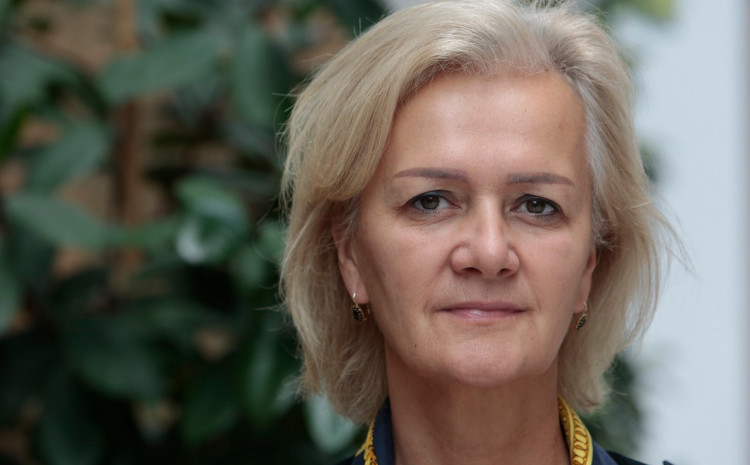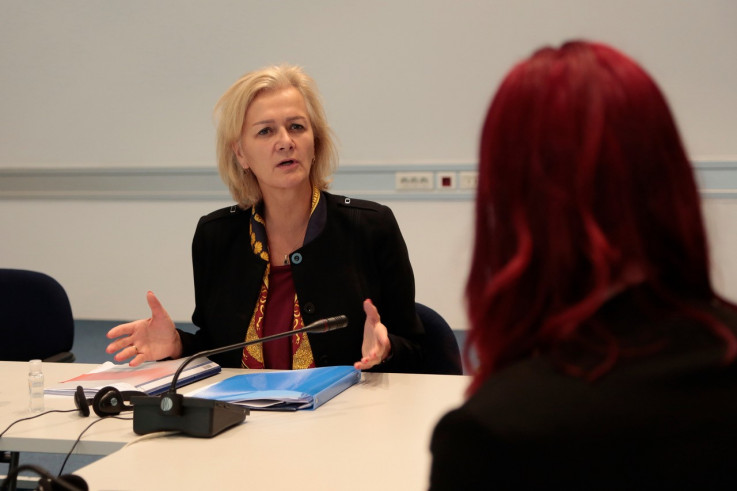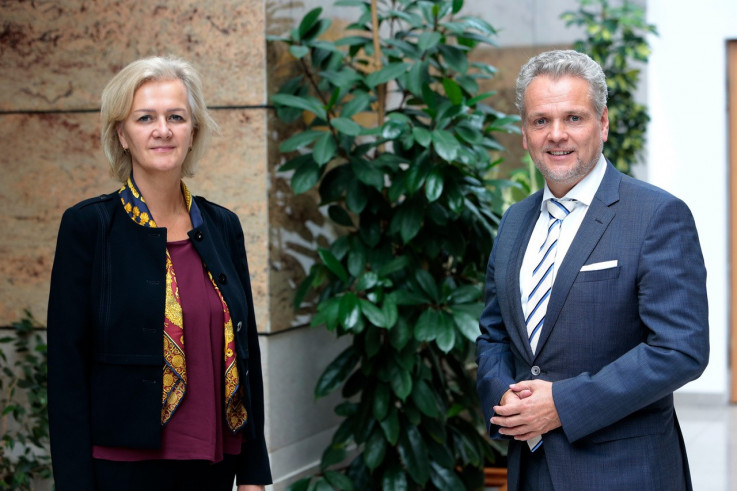Director for Western Europe, Western Balkans, Turkey and the United Kingdom in the European External Action Service Angelina Eichhorst spoke in an exclusive interview with „Dnevni avaz“ about what changes to the B&H Election Law are needed, as well as the Constitution and the Dayton Agreement.
EXCLUSIVE INTERVIEW
Angelina Eichhorst for "Avaz": Make the transition from Dayton to Brussels
Changes to the Election Law are possible if there is political will, she pointed out
Eichhorst: Accelerate the process of joining EU. Avaz
Eliminate discrimination
Negotiations are under way to make amends to the B&H Election Law. What changes are needed to make the upcoming general elections transparent?
-We had really good meetings today (yesterday, Op. cit.), very clear messages were sent. As Ambassador Sattler and Ambassador Nelson repeated, one message of togetherness, one transatlantic message, if I may say so. But, somehow, also a message that is close to a lot of citizens. On the one hand, you have verdicts of the European Court of Human Rights, a significant number of cases and verdicts in those cases that needs to be implemented.
On the other hand, you have the possibility of amending the Constitution, you have a number of recommendations of the Venice Commission, OSCE, ODIHR/GRECO, so you have all the things to be considered in the context of the Election Law, work on the elections for the Presidency, House of Peoples. .. Most citizens, in fact, more or less know what are the issues that needs to be addressed. It is also part of the package from the Opinion of the European Commission or, in short, B&H's path to the EU.
Today (yesterday, Op. cit.) the clearest message was that there is one awareness of importance, and not only importance but also urgency. That is the year when there are no elections, you now have the opportunity. The EU, of course, wants the elections to take place next year, and to that end we are doing all of this to improve the electoral framework. We are aware that this is a complex matter, it is easy to say, eliminate discrimination or election fraud, but it entails a lot of work. The basic thing is, get involved, get to work. An Interdepartmental Working Group has been established, which includes all actors. A lot of work has already been done, they have already met several times. It is very important that they can meet outside the media, therefore, not always under the spotlight.
In short, there are clear messages about what needs to be done. Now, the question remains what are the attitudes of different political entities. We need to see where some, perhaps, common grounds is and what could be a winning combination, not for two, but for all sides.
Because we really want a solution that will satisfy everyone, not something that would satisfy the leading parties. We want something that is satisfactory to all political actors and to society as a whole. Today (yesterday, Op. cit.) we had lunch with one part of the opposition. We remain engaged at the level of Brussels, of course, with the full support of our colleagues on the ground, Ambassador Satler and his associates, member states. We will consistently follow that in Brussels as well. We have all the mechanisms that can lead to results. This is quite ambitious, but I don't think it's impossible.
Eichhorst: Keep working hard and prioritize the functionality of the institution. Avaz
General elections are schelduled for next year. Do we have enough time to implement all the necessary changes to the Election Law?
-Yes, this is actually a good question, from my experience in such processes, when there is political will and when it is clear to people what needs to be done, and the question remains how it should be done, I think it is possible. If nothing else, some of the steps can be implemented. I can’t guess if they will be successful in modifying any of these aspects, because these are quite demanding things.
Amendments, changes of regulations, so it's really a lot of work, but what's important is that you always have a moment in life when you draw the line and say - okay, we've made some strides, now it's July and the European Union will too talk about the situation in B&H. You have a session of the Council in July, we have a big summit in October, so we will reconsider the situation in B&H. Of course, next year's elections. But there are usually those political moments where everyone somehow wonders - well, what's going on here?
And I really think that it is in the interest of all subjects for the answer to be "it happens that we are working on it, we are ready to find a solution". This would not be the first time, I know that there have been a lot of attempts in the past, packages ... I just said in a conversation with Ambassador Sattler that we do not look back at all and do not refer to some earlier model names. I'm not saying that we are starting from scratch, but this is now an attempt to look forward once again, without talking about how it used to be, and come to a solution.
When it comes to the rule of law, where have we failed and what changes are needed?
-Maybe to formulate it differently and think differently as well - where we were successful. But I think that Ambassador Sattler has repeated this many times, there are, indeed, concrete amendments to the law, as well as laws that need to be adopted. They can’t stay in drawers forever. We are talking about the Law on Public Procurement, the Law on the HJPC. As for, in particular, the Law on Public Procurement, there is a real opportunity at the end of July for its adoption. We are only talking about the adoption of legislation here.
But it is not only the legislation that matters, you must also have an electoral framework, within which citizens believe that elections are conducted in accordance with the principles of transparency, where any embezzlement of election results is prevented, citizens, if they go to the polls, their vote matters . That is the essence of any democratic process, so that you know, if you voted, that your vote is recognized. But it is not only a question of the rule of law but also of functionality. If at the FBH level you do not have the necessary elements and tools, if you do not have the appointment of ministers, if you do not have decision-making structures, then it is simply not easy.
I know it's not easy. But, again, we need to somehow look at what has been done and that may have been one of the key messages of these meetings. The agreement in Mostar was implemented. You had elections in Mostar after 12 years. So this is one example of an extremely important agreement that has been agreed upon very concretely. An agreement has been reached, implemented, elections have been held, you have a mayor, you have a strategy for working on war crimes cases, which has now been adopted.
Then, there are several steps that have been taken in the context of public administration reform, so certain steps have been taken, but we must not forget that the dynamics there have been slow, perhaps too slow. There are a lot of activities of the international community as well, but I think we have a lot of new, young voters, but also people on the political scene who clearly want to address these issues.
Eichhorst and Sattler. Avaz
Hard work
Many say the Dayton Peace Agreement is the brake on B&H's progress. What changes are needed in the agreement and the B&H Constitution in order for the country to make progress?
- You may have already heard this in the statements of High Representative Borrell, during his visit to B&H last year, I was also with him and I think it was very clear that Dayton exists as a framework in which everyone acts, but we want to see B&H make that transition from Dayton to Brussels.
And these really aren’t just some mere phrases, but we want to see real work. And that means working on European standards, working on the acquis. Because one day when you open negotiations on the joining EU, you have to work on taking over the whole acquis. You are now still in the phase when you need to realize 14 key priorities from the Opinion of the European Commission. There have been some issues that may be simpler and can be resolved sooner than others, but, in general, it is a framework. So this transition from Dayton to Brussels is a good guideline where the future of this country lies.
How far have we progressed on the European path? What else do we have to fulfill?
-It's a little harder question in the sense that we're not here to judge anyone. But, in principle, everyone knows clearly what are the priorities that need to be met. We should not forget the economy or socio-economic reforms in general, we talked about that as well. But here, I will say it as follows - progress is not fast enough, it is too slow. Your work on realizing the priorities from the Opinion can bring you closer to what we all want, and that is candidate status, and generally speed up your accession process. And the only message for now is to continue to work hard and give priority to the functionality of institutions, adopt the necessary laws and show everyone in B&H that progress is possible.
OHR has a clear mandate
A new High Representative, German politician Christian Schmidt, is coming to B&H in August. What changes will Schmidt make?
- We, of course, work closely with the OHR and will continue to work closely, no doubt. The OHR has played a very important role in harmonizing the Mostar agreement. Thanks to our presence and commitment, we have an entire EU program where we work closely with the OHR and we will definitely continue to do so. The OHR has a very clear fulfilling mandate, the so-called 5 plus 2 agenda, which is important to us.
We are focused on Opinion, on the implementation of Opinion. All EU member states have agreed on that. I don't think it's a person who matters, just that person. It is simply an important institution as such. We have good relations. We agree with them, we act constructively within its framework and in addition you have an overall European agenda. And we, of course, try to ensure complementarity, synergy to work on achieving common goals. I think that's clear.
We don’t make non-papers
At the end of April, the President of Serbia, Aleksandar Vučić, stated that you are behind the non-paper on resolving the Kosovo issue. Also, in the last few weeks, the story of non-paper related to B&H is current...
- I think that question has already been asked and that we have given an answer. We don’t make non-papers, non-questions or anything like that. A lot of media attention went to that non-paper story, which I think upset and confused the public, it didn’t help at all.
Especially when you have a very clear direction, a clear path and clear messages about what the EU wants, not only for B&H but for the whole region. Well, now that others appear with some of their other agendas, then we can only urge you to make one reasonable assessment based on your own knowledge and information available. We focus only on what matters. I can only say, stay on your set course, don't be distracted by various distractions in the media. Stick to the set path.


